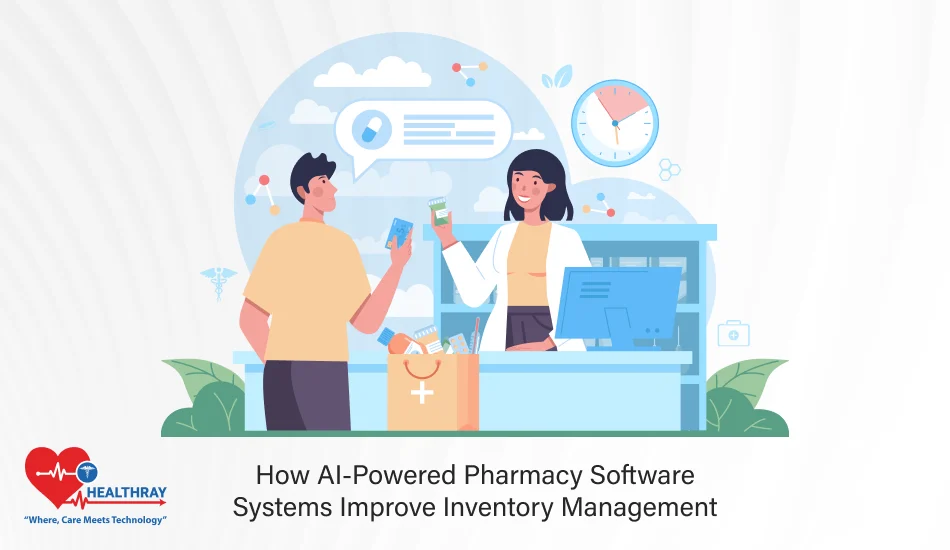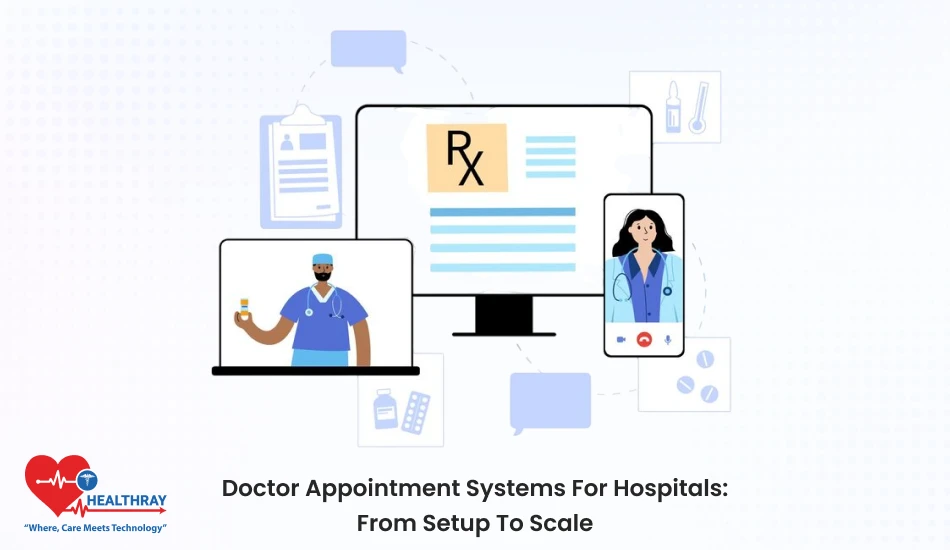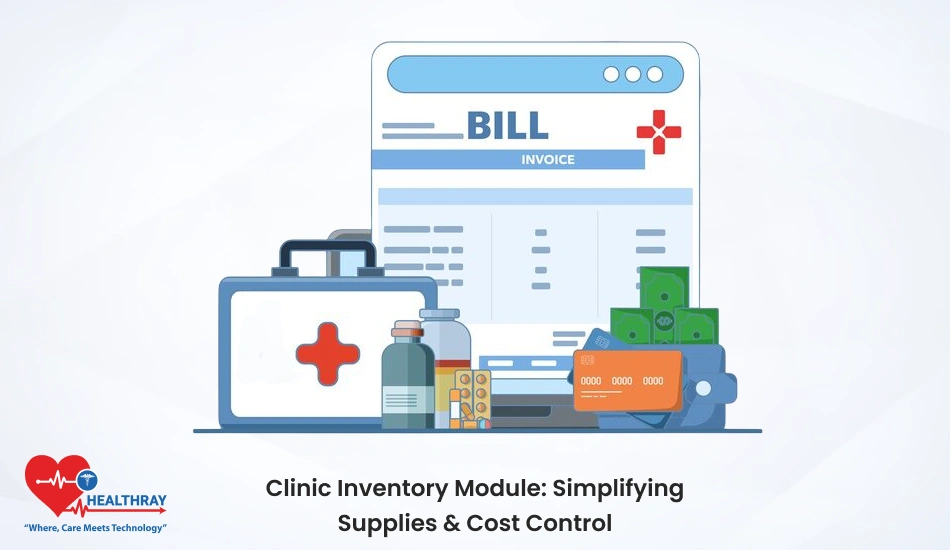Pharmacy inventory management is no piece of cake. From correctly tallying stock to putting expiration dates in order, making sure key medications always remain in stock requires exactness. This is where AI-powered pharmacy software systems come in.
These systems apply advanced technologies in order to optimize inventories, reduce wastes, and save costs, while at the same time enhancing patients’ safety. They analyze data for the purpose of forecasting demand with high accuracy, performing routine tasks, and providing
insights to pharmacy owners, software developers, and hospital administrators for informed decision-making.
This article will explain how AI is changing pharmacy management of inventory and all the different ways it is contributing toward the smooth operation of businesses, from avoiding stockouts to enabling better patient care.
Understanding AI-Powered Pharmacy Software Systems
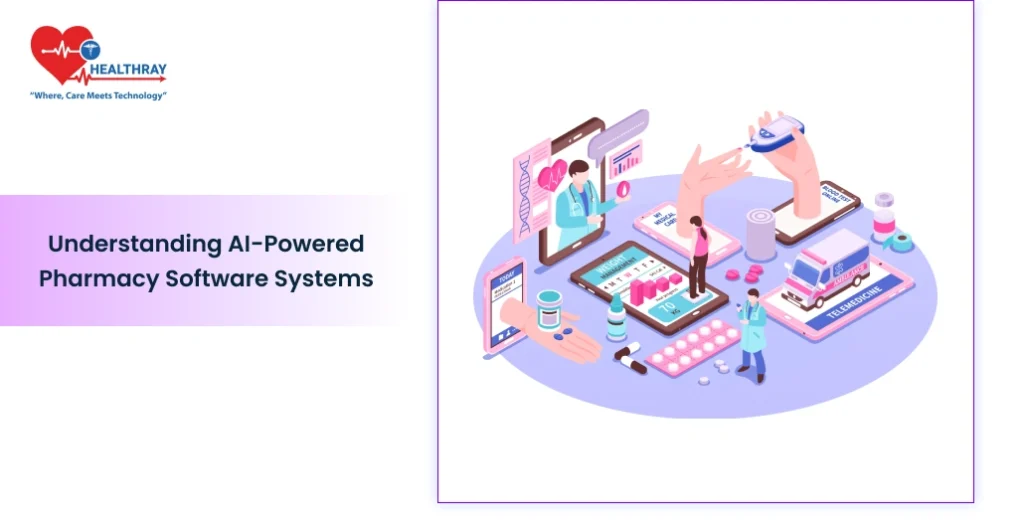
AI-powered pharmacy management systems are set to revolutionize the way inventory is managed in both pharmacies and health institutions. In essence, the backbone of such systems involves the use of artificial intelligence in data processing, pattern identification, and prediction to simplify duties that relate directly to inventory management.
Key features of AI in pharmacy software
- Demand Forecasting: AI systems analyze historical sales data, seasonal trends, and even local health trends to project forward medication demand. In this way, pharmacies can ensure they have the right medications in the right quantities.
- Automating Order Placement: When inventory reaches a certain level, these systems can automatically place material orders. This eliminates the need for manual intervention and reduces the possibility of human error during reorder.
- Real-time tracking of inventory: gives them a correct view of inventories and affords them ample opportunities for timely action whenever a shortage or overstock situation presents itself.
- Expiration date monitoring: AI tools will monitor the expiration dates of various medicines and automatically notify when items approach their expiration dates. It helps reduce waste besides ensuring patients get safe and effective medications all the time.
- Integration with Other Systems: Many AI-driven solutions integrate with systems for billing, point-of-sale, and patient management, hence putting everything into one perspective.
How Pharmaceutical Inventory Management Software Works
The pharmaceutical inventory management software utilizes machine learning algorithms, which refine over time. Analyzing each transaction makes them continually aware of patterns and provides actionable insights. For example, during flu season, as it typically increases demand for a certain medication, the system can proactively adjust stock recommendations.
For whom are these systems useful?
- Pharmacy owners: Take full control of your inventory and avoid losses associated with expiration or unused products.
- Software Developers: Modern pharmacies require an understanding of their core functionalities as a way to innovate around their needs.
- Healthcare Administrators: Ensure that hospital administrators duly maintain better control over the operation of a hospital pharmacy so that needed drugs can be always available.
AI-powered pharmacy software is less a tool and more a strategic partner in the running of the pharmacy. Predictive capabilities, along with process automation, create the ability for pharmacies to perform more efficiently and stay focused on patient care.
Benefits of AI in Inventory Management
AI-enabled pharmacy software systems bring a set of advantages that directly address the challenges of inventory management. The systems assure better accuracy, less waste, and proper availability of drugs in demand, thereby making the whole process hassle-free for pharmacies and institutions alike.
Accurate Demand Forecasting
AI analyzes historical sales data, seasonal trends, and other external factors like health outbreaks to predict demand for specific medications. This enables pharmacies to estimate demand with a high degree of accuracy and stock only what they will sell, to avoid overstocking or running out of critical items.
Automation of Routine Tasks
The AI systems automate core inventory tasks, including reordering and tracking of stock levels. Instead of manually checking the stock or preparing any purchase order, the software does it on its own. This saves your time and reduces the possibility of mistakes while freeing the staff to take care of your patients.
Real-time Insights
Consequently, AI allows the owners and managers of pharmacies to access real-time inventory levels. This helps them respond promptly to when inventory gets low, or it highlights which medicines are not selling fast enough. Better decision-making and efficient use of storage space are the results.
Reduced Medication Waste
Expiration date tracking ensures the use of medicines prior to their expiration dates. AI can notify regarding the same when products are nearing their expiration dates, hence prompting action on what to do-whether to use or discard, in order to avoid financial losses and to ensure that expired medications are not administered to patients.
Cost Savings
AI systems will guarantee significant cost savings since the system reduces waste, optimizes stock levels, and prevents over-ordering. The pharmacies can maintain leaner inventories without sacrificing service quality and enjoy better profitability.
Improved Patient Safety
With AI, medications critically needed can always be available for management that takes place on-time, preventing cases of delayed treatment. Inventory monitoring systems permit the non- dispensing of out-of-date medications, improving the quality of care and safety.
Synchronization smoother with Suppliers
Most AI systems are designed for integrating with direct suppliers for immediate communication once the stock needs to be refilled. And herein restock automatically, decreasing lead times and focusing on the immediate restock.
Scalability of Operations for Growth
Further growth can be annexed for the hospital pharmacy through the aid of AI; the ease with which AI can handle the expanded demand and related hassle verifies its monumental presence in a growing set of operations, without any seeming additional manual intervention.
Impact of AI in Patient Care and Safety

Leading to the said significant advancements is the fact that AI boosts pharmacy systems to improve patient safety and drive the quality of care up a few notches. Better error management mechanisms would practically engrain trust and reliability into the pharmacy operations by bringing about much-needed reduced errors by consistently providing for a smooth-level administration of the medication of the highest quality, yet so dependable and utterly ethical.
Enhancing Medicine Availability
The function of AI in tracking the optimum level of stock for frequently consumed drugs that ought to be in a pharmacy all the time for patients in need is priceless-from the perspective of emergencies or seasonal surges. For instance, AI can determine great demand in antiviral medications that are needed in the flu season and adjust the stock levels according to that prediction.
Minimizing Dispensing Errors
Human errors of such magnitude may commit huge grave offences such as wrongly requesting the wrong medications or placing incorrect calculations leading to placing near-to-expiry drugs in stores.
An AI agents system relieves this serious security hazard. With ai agent development services, an AI agents system relieves this serious security hazard. It checks accidents automatically and flags any breaches there for real-time correction and issuance of the right medications consistently.
Expiration Date Tracking
Expired medicines pose a significant danger to patient safety. AI-powered systems track expiry dates and notify the staff when products are nearing it. Such proactive measures may deter the dispensing of any expired stock. This guards against threats to the health of patients.
Preventing Running Out of Essential Drugs
Shortages of life-saving drugs often translate into late start of therapy and reduce the standard care. AI uses trend monitor and predicts near stockout well before it occurs for timely availability of all critical drugs when they are largely needed by patients.
Ensuring Custody of Precision Medicine
Among these acceptances, AI-enabled medicine supports the efforts by a hospital administrator linking inventory data that come with patients’ needs with respective treatment protocols, thus ensuring that certain drugs fit into the care scaffold of every person.
Positive Effects in Staff Performance for Worthy Service
While AI performs routine activities like keeping inventory or making orders, the staff at pharmacies can actually get engaged with patients and their care. This, subsequently, enhances patient care and satisfaction.
Improving Trust in Pharmaceutical Care
To date, the only factor that has had the higher-ranking pharmacy consistently throughout the time has been the ever-existing high-quality care that relies upon the implementation of AI technology. Knowing that the services of a pharmacy are always ensured, such as not running out of major drugs, shines hope on a patient.
Case Studies and Success Stories
Real-world examples are testimonies of the magical results that can be achieved with AI in pharmacy inventory management. Success stories from several establishments underline the tremendous improvements they have seen as they have taken on AI-powered systems.
Case Study One: Retail Chain Pharmacy
A massive retail pharmacy chain had AI-driven inventory management software put into its multiple locations. It analyzed its historical sales, seasonal trends, as well as other demographics in its branches.
- Results:Optimal inventory management: Excess inventory reduces by 30% to create storage space therefore reducing costs majorly.
- Demand forecasting: Rate of stockout in major drugs reduces by 40% to ensure timely availability to customers.
- Waste leads: Reducing date drugs by 25% with minimal wastage in terms of finance and the environment.
This success is all about the system’s ability to predict demand accurately through an autonomous reorder process.
Case Study Two: A Hospital Pharmacy
A mid-level hospital adopted AI software that quickly adapted to its splendidly difficult and complex inventory requirements. The stock included many functional drugs, among which there were several very expensive specialty drugs of the short lifespan.
- Results: Expiration Tracking: The system had alerted the pharmacy staff of medication near expiration to be removed first from the shelves; results-20% less wastage in medications.
- Improving Patient Care: Those items, which had the greatest demand, were never out of stock.
- Staff Efficiency: Pharmacy staff on an average saves 15 hours (per) week now that they no longer have to track inventories manually.
The AI system had been integrated well with hospital management software dealing with the handling of patients and ensuring medicines to be provided accordingly with patient treatment.
Case Study Three: Healthcare Software Developer
A software company made an AI solution available for independent pharmacies. The system is designed for ease of use and can be of great assistance for any small operation suffering a limited IT infrastructure.
Results:
- Adoption Growth: More than 500 independent pharmacies have adopted the software within its first year.
- Automation Benefits: Less time, by 35%, in managing inventory was achieved in small pharmacies.
- Customer Retention: The pharmacies that used the software could keep holding their customers because the medicines were always available in stock.
The case was indicative of the value of scalable AI solutions to empower smaller players in the pharmacy sector.
Learning from the Success Stories:
- Scalability is the Main: AI systems can be designed to fit not only into small pharmacies but also into big setups.
- Data-Driven Decisions Work: Real-time analytics, combined with good predictions, do improve results everywhere.
- Value from Integrated Solutions: Integration with legacy systems is essential for maximizing return on investment from AI adoption.
These case studies prove that the implementation of AI in inventory management offers not merely theoretical concepts but tangible benefits in the real world-an aspect that would also be more obvious to other observers.
Challenges and Considerations in AI Implementation
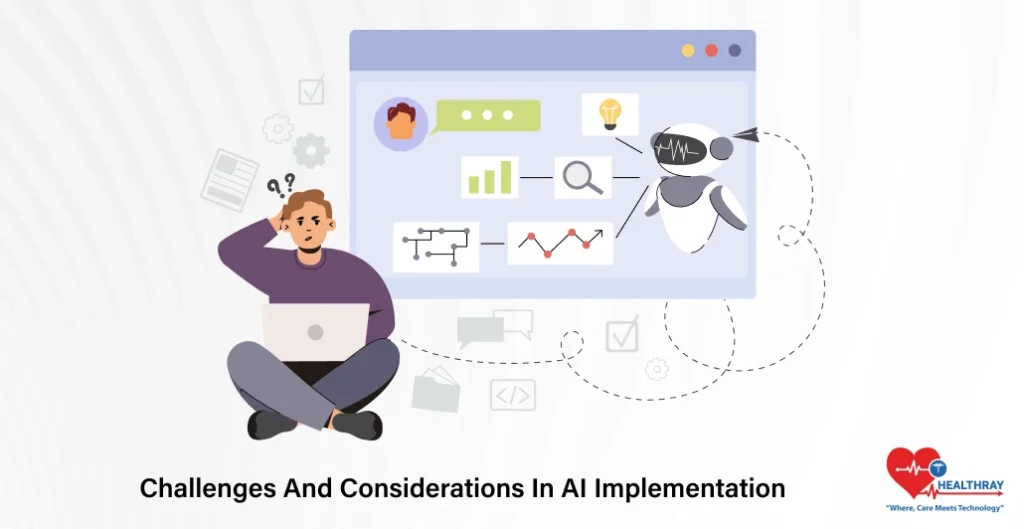
The reality is that AI-powered pharmacy software has tremendous advantages. However, it takes time and money to implement it. Last but not the least, it requires a strong willingness from almost all the employees to accept the change.
Smart shelves and RFID-enabled tags can automatically track the stock levels, location, and date of expiration. This can be seamlessly integrated with the AI systems for increased accuracy in inventory management.
Advanced Demand Forecasting with External Data
In the future, more and more external data will be integrated, including weather, public health alerts, events, etc., to enhance demand forecasting. For example, it might predict cold medication sales will rise during colder-than-usual winters or during flu outbreaks.
Blockchain for Supply Chain Transparency
The transparency of records in supply chains enabled by blockchain technology well complements AI. AI systems make use of the data to track the origins of medication, eliminate counterfeits, and ensure high standards as per regulations.
Autonomous Pharmacy Operations
Fully autonomous pharmacies may soon become a reality. AI-driven robots can carry out inventory management, dispensing medicines, and handle all interactions with customers, reducing human intervention to mere supervisory roles.
Augmented Reality for Inventory Management
These technologies can also enable staff to overlay real-time data on physical stock. AR glasses, for example, will allow a pharmacist to identify low-stock items or medications that are near expiration.
Enhanced AI Algorithms with Machine Learning
AI systems will keep improving with refined ML algorithms. Each of these learns from historical data and real-time data, giving insights that grow progressively more precise. Continuous learning capabilities make them all the more adaptable in changing conditions.
Focus on Sustainability
AI systems will continue to help contribute to eco-friendly practices by reducing medication waste and optimizing delivery routes to lower carbon footprints. Customer loyalty for pharmacies that lean toward sustainability will increase, along with the capability to adhere to environmental policies.
Cloud AI solutions
Cloud computing, while getting stronger, will see AI-powered inventory systems move toward cloud-based platforms. These cloud-based platforms allow for easier upgrades, scalability, and integration across a number of locations.
AI-Powered Patient Engagement
AI systems may also start connecting inventory management with patient engagement tools, including notifications of medication availability or suggestions for alternatives in cases where prescriptions are out of stock.
Conclusion
AI-driven pharmacy software systems revolutionize inventory management to make it smarter, faster, and more efficient. From demand forecast accuracy down to real-time tracking, improvement of patient safety-the challenges of pharmacies, hospitals, and healthcare developers are covered.
With AI, pharmacies can optimize their stock levels, reduce waste, and focus on the delivery of better care to patients. This indeed makes a way for healthcare institutions to reduce costs and enhance efficiency while making sure that developers of Hospital Management System software
come up with innovative solutions aimed at meeting the growing demands of the industry.
The prospects of AI in inventory management are promising. As the technology advances, so does its role in shaping the future of pharmacy operations. Companies that invest in AI today will solve current problems and set themselves up for future success.
